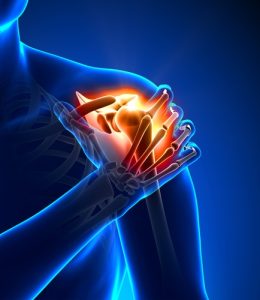 Results from this prospective, cross-sectional study demonstrated catastrophic thinking and lower self-efficacy were linked with more shoulder pain and disability among patients who presented with shoulder pain and had no history of shoulder surgery.
Results from this prospective, cross-sectional study demonstrated catastrophic thinking and lower self-efficacy were linked with more shoulder pain and disability among patients who presented with shoulder pain and had no history of shoulder surgery.
“Our data support the notion that patient-to-patient variation in symptom intensity and magnitude of disability is more strongly related to psychological distress than to the specific shoulder diagnosis,” the researchers wrote.
Researchers enrolled 139 patients who completed a sociodemographic survey, as well as the Shoulder Pain and Disability Index (SPADI) questionnaire, Patient Health Questionnaire Depression Scale (PHQ-2), Pain Catastrophizing Scale (PCS) and the Pain Self-Efficacy Questionnaire (PSEQ). Investigators used bivariate and multivariate analyses to identify demographic factors and psychosocial factors that correlated with shoulder pain and disability.
According to results from the bivariate analysis, there was a medium correlation between SPADI scores and PCS, PHQ-2 and PSEQ scores. SPADI scores also correlated with work status and BMI.
Multivariate results showed compared with being employed, greater catastrophic thinking, lower self-efficacy, higher BMI, being disabled and retired correlated with worse SPADI scores. Primary diagnosis was not significantly associated with SPADI, according to researchers.‒ by Monica Jaramillo
This article originally posted on Healio.com.







